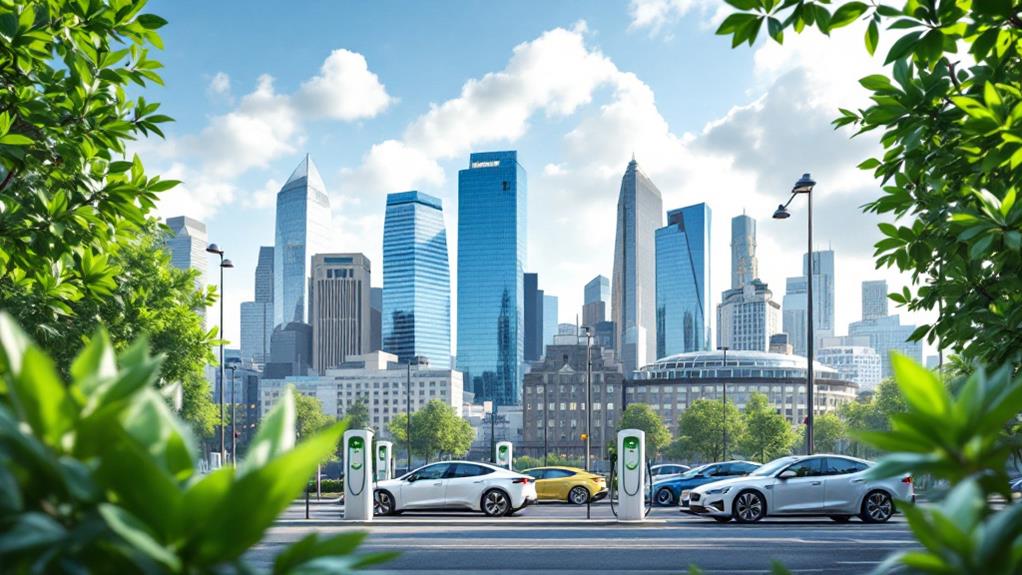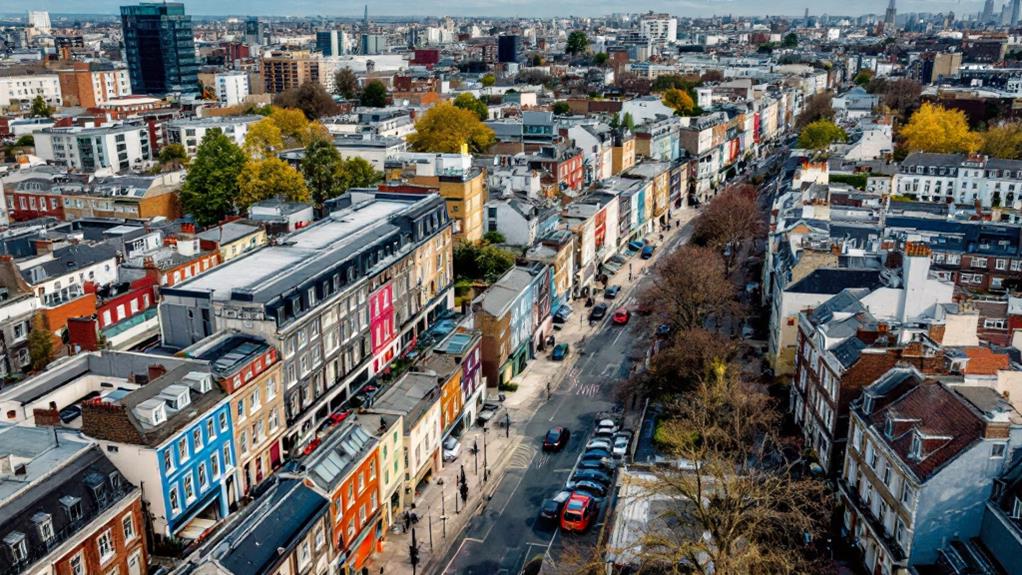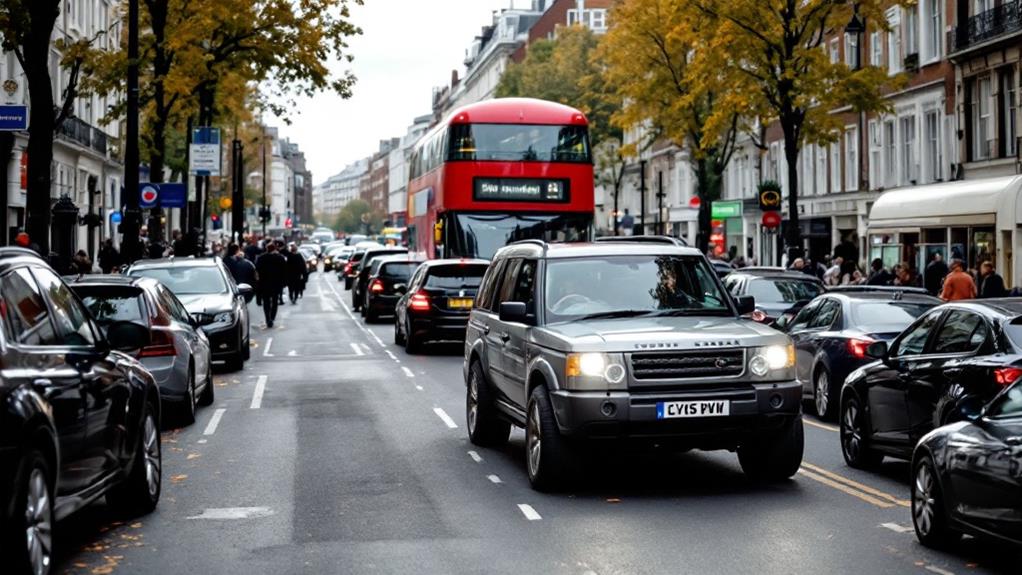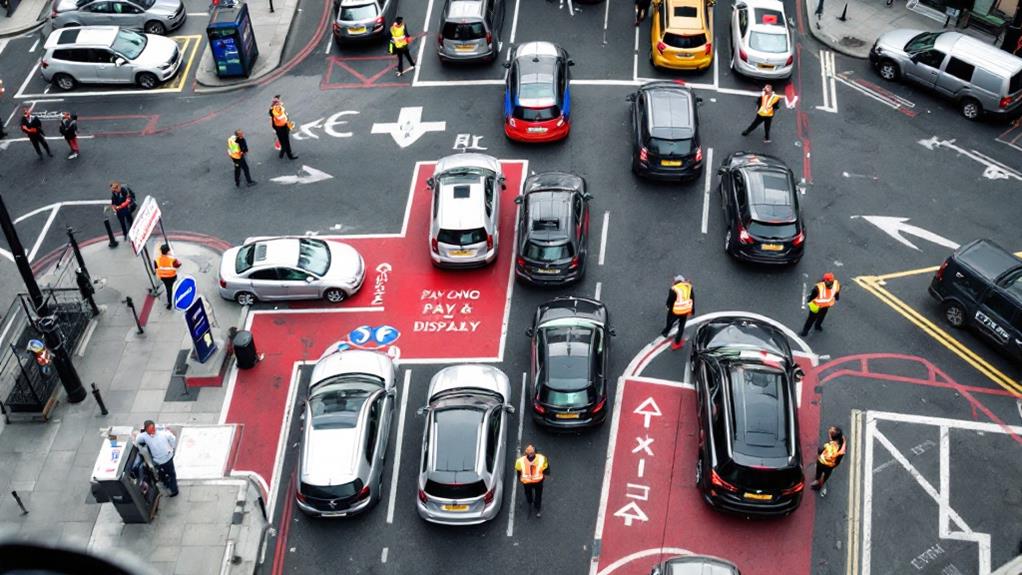How London Events and Festivals Affect Parking Availability
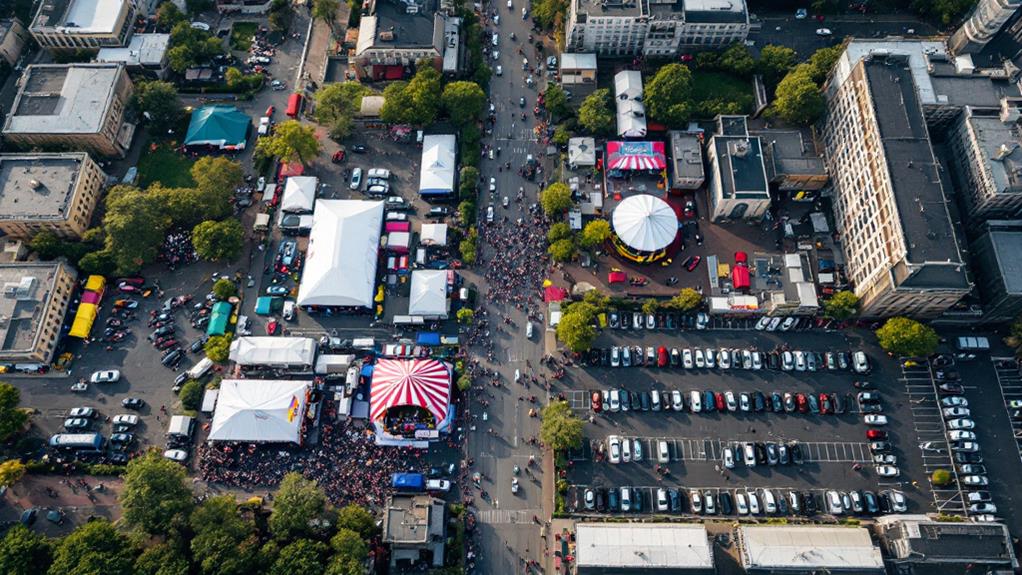
London's events and festivals drastically impact parking availability, creating a complex system of zones, permits, and restrictions. You'll encounter three key Event Day Parking Zones: A, B, and C, each with varying levels of access and limitations. Residents within these zones need permits to park, while visitors face strict restrictions. Parking hours are regulated differently for main roads and residential areas, typically from 8am or 10am to midnight. Motorcyclists enjoy more flexibility but should check for specific rules. Large-scale events, like those at Wembley Stadium, pose challenges for local communities and businesses. Comprehending these regulations is pivotal for traversing London's event-day parking terrain.
Event Day Parking Zones
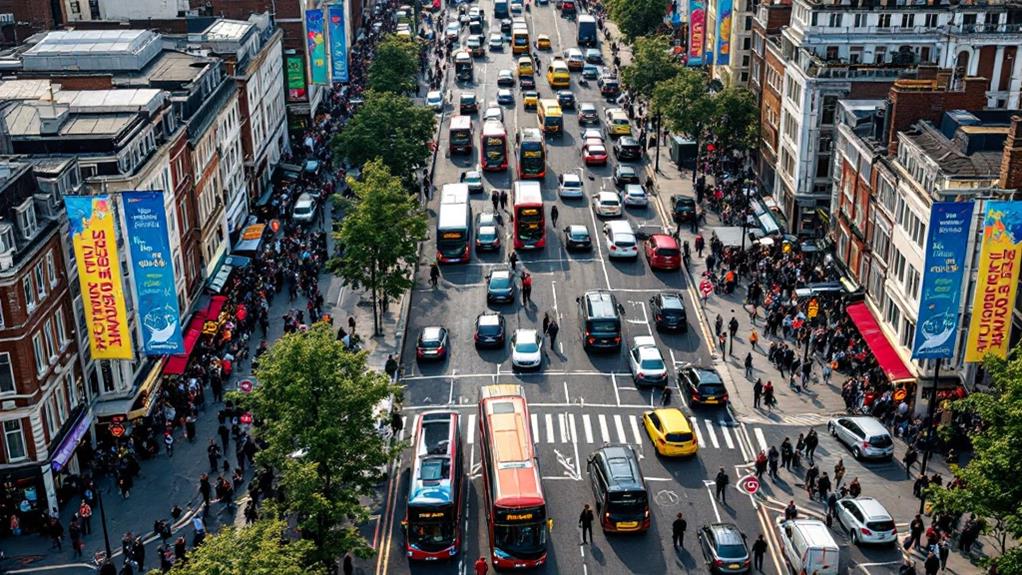
Three key Event Day Parking Zones are established during major London events and festivals. These zones help manage traffic flow and guarantee residents can still access their homes. Zone A is the closest to the event venue, with strict parking restrictions for non-residents. You'll need a special permit to park here, which is typically reserved for event staff and emergency vehicles.
Zone B acts as a buffer area, offering limited parking for event attendees. You'll find some off-street parking options in this zone, but they fill up quickly. It's best to book in advance if you plan to park here. Zone C is the outermost area, where you'll find more parking availability. This zone often includes park and ride facilities, allowing you to leave your car and take public transport to the event.
When planning your visit, consider using park and ride facilities in Zone C. They're usually less expensive and reduce congestion near the venue. If you must park closer, look for pre-bookable off-street parking options in Zone B. Always check event-specific parking information, as zones may vary depending on the festival's size and location.
Permit Requirements for Residents
Residents living within event day zones face specific permit requirements to guarantee they can park near their homes during major London events. If you're a resident or business owner in these areas, you'll need to apply for a permit to park where it's allowed on event days. This permit application process is essential to avoid parking tickets or vehicle removal.
The permit eligibility requirements extend to residents of both public and private roads within the event day zone. Even if you live on a private or unadopted road where the council doesn't enforce parking, you can still purchase a permit to park in enforceable areas of the zone.
It's important to note that event day parking restrictions operate from 8am to midnight on main roads and 10am to midnight in residential areas outside controlled parking zones. Without a permit, you'll risk receiving a parking ticket and potentially having your vehicle removed from the zone.
Motorcyclists have more flexibility, as they can park in any space without charge or time limit, provided the parking space hasn't been suspended. However, it's advisable to check for any specific restrictions during events.
Restricted Parking Hours
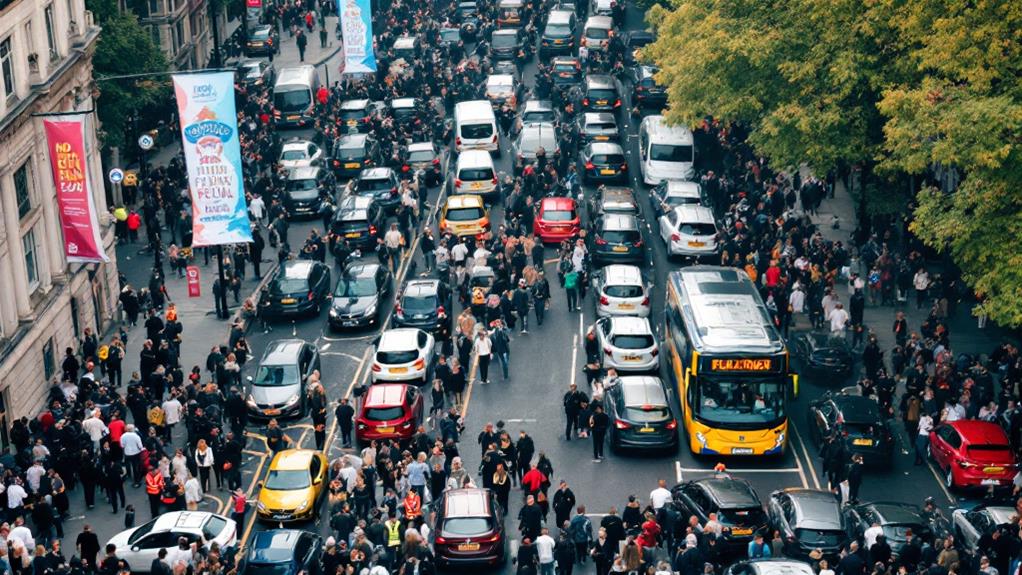
Nearly all London event day parking restrictions follow a consistent schedule, with slight variations depending on the area. You'll find that restricted parking hours generally span from early morning to midnight, guaranteeing smooth traffic flow during major events.
Main roads to the stadium: 8am to midnight
Residential areas outside controlled parking zones: 10am to midnight
Controlled parking zones: 8am to midnight (some start earlier)
Motorcycles: Exempt from restrictions in most cases
These timings are designed to balance the needs of residents, businesses, and event attendees. However, enforcement challenges can arise, particularly in private or unadopted roads where council parking enforcement doesn't apply.
If you're a resident or business owner, you'll need to obtain a permit to park within the Wembley event day zone during these restricted hours. Without a valid permit, your vehicle may be ticketed or even removed. It's imperative to plan ahead and secure the necessary permits to avoid any parking-related issues during events. Remember, these restrictions are in place to manage traffic and guarantee safety for all, so compliance is essential.
Motorcycle Parking Rules
During major London events, motorcycle parking rules offer a welcome respite for two-wheeled enthusiasts. You'll find that motorcycles can be parked in designated spaces without charge or time limits, as long as that part of the parking space hasn't been suspended. This flexibility extends even to Wembley Stadium events, where up to 90,000 attendees might gather.
It's important to note that motorcycle parking enforcement is limited to public highways. If you live on a private or unadopted road, you won't benefit from the council's enforcement of these rules. However, don't worry – you're not left without options. You can still purchase a permit to park your motorcycle in enforceable parts of the event day zone.
For those seeking motorcycle parking alternatives during busy London events, consider exploring areas just outside the event zone. Remember that the council's authority doesn't extend to private property, so you might find more flexible options there. Always check local signage and regulations to comply with the rules. By understanding these rules, you can maneuver through London's active event scene with ease on your motorcycle, avoiding potential parking headaches and fines.
Impacts on Local Communities
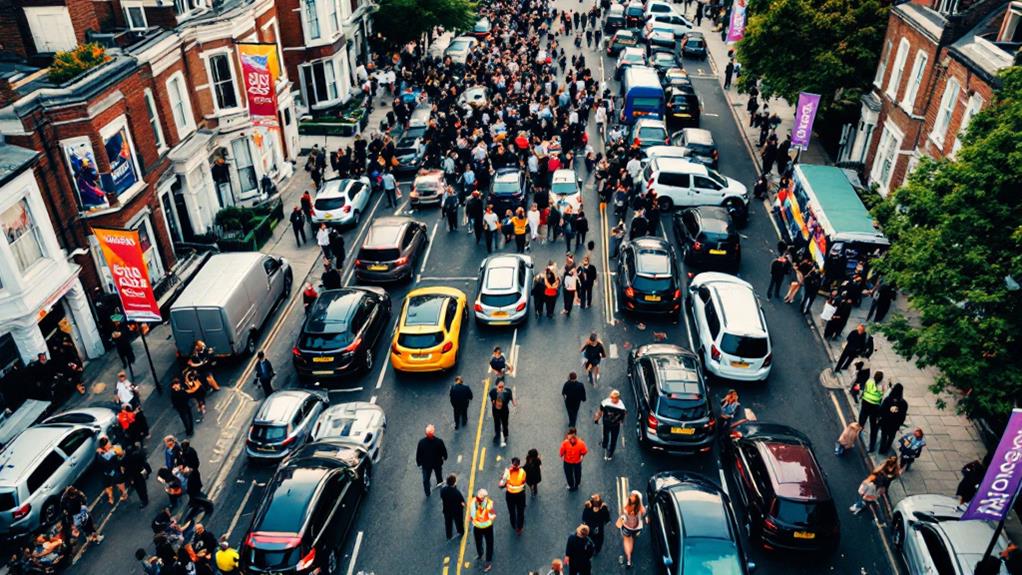
While motorcycle parking rules offer some flexibility, the impact of large-scale events on local communities can't be overstated. Wembley Stadium, with its massive event attendance capacity of up to 90,000 people, exemplifies the challenges faced by residents and businesses in the surrounding area. The influx of visitors leads to significant disruptions, particularly with respect to parking and road closure impacts.
To mitigate these issues, the council has implemented an event day zone with specific parking restrictions. Parking is limited to residents and businesses with event day permits. Restrictions apply from 8am to midnight on main roads, and residential areas outside controlled parking zones have restrictions from 10am to midnight. Vehicles without permits may be ticketed and removed.
If you live on a private or unadopted road, you won't benefit from council enforcement. However, you can still purchase a permit to park in enforceable areas of the event day zone. To stay informed and plan accordingly, check the council's website for upcoming events and permit information. By understanding these regulations, you can better manage the challenges posed by large events in your community.
Enforcement on Public Roads
Faced with the challenges of managing large-scale events, local authorities have implemented strict enforcement measures on public roads. You'll notice increased patrols by traffic wardens and police officers during festivals and events. They're on the lookout for illegal parking, ensuring that emergency routes remain clear and residential areas aren't overwhelmed by visitor vehicles.
During these times, you'll find that curbside loading zones are closely monitored. These areas are indispensable for event logistics, and unauthorized parking can result in immediate towing. If you're a local resident, you'll need to pay extra attention to your on-street parking permits. Event-specific restrictions may temporarily override your usual parking rights, so it's crucial to check for any changes in advance.
Enforcement officers use a combination of physical ticketing and digital systems to manage infractions. You might see them equipped with handheld devices for real-time reporting. If you're attending an event, it's wise to use designated parking areas or public transport to avoid hefty fines. Remember, ignorance of event-related parking changes won't be accepted as an excuse for violations.
Private Road Parking Considerations
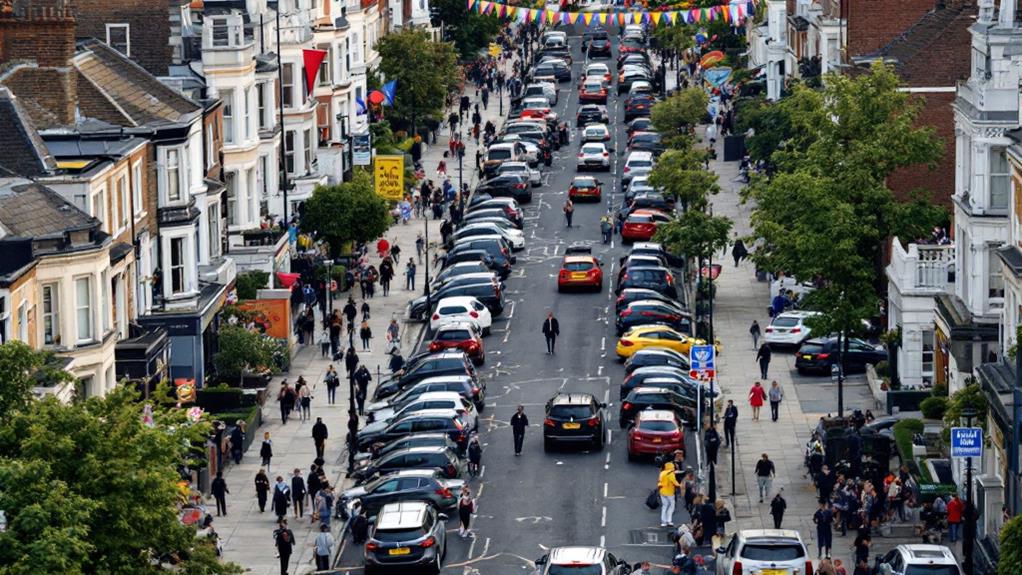
When it comes to private road parking during London events, you'll find a different set of rules apply. If you live on a private or unadopted road, you won't benefit from the council's parking enforcement on event days. This means vehicles can park on these roads without being subject to the council's event day restrictions.
However, you're not entirely left out of the event day parking system. You can still purchase a permit to park in enforceable parts of the event day zone if you need to. Keep in mind that the council can only enforce parking restrictions on public highways, not on private or unadopted roads.
As a resident of a private road, you'll need to manage your own parking arrangements during events at Wembley Stadium. This may involve:
- Setting up private road signage
- Implementing your own parking controls
- Coordinating with neighbors to manage parking
- Considering private road costs for maintenance and enforcement
It's important to understand that while you may face challenges during events, you also have more control over your parking situation. You can tailor your approach to suit your specific needs and those of your neighbors, creating a parking system that works best for your private road community.
Planning for Event Attendance
Event attendees' success in traversing London's lively event scene hinges on careful planning. When considering events at Wembley Stadium, which can draw up to 90,000 people, you'll need to be aware of the significant parking restrictions in place. These restrictions aim to minimize disruption to the local community and operate from 8am to midnight on main roads and 10am to midnight in residential areas.
To avoid receiving a ticket or having your vehicle removed, you'll want to investigate event parking solutions well in advance. Check the council's website for information on future event dates and event day permits. If you're a resident or business owner in the Wembley event day zone, you'll need to obtain the appropriate permit to park during events.
Consider sustainable transportation options to sidestep parking challenges altogether. Public transit, cycling, or ride-sharing services can be excellent alternatives. If you must drive, arrive early to secure parking in designated areas outside the restricted zone. Motorcyclists have more flexibility, as they can park in spaces without charge or time limit, provided the space hasn't been suspended.
Finding Event Information Online
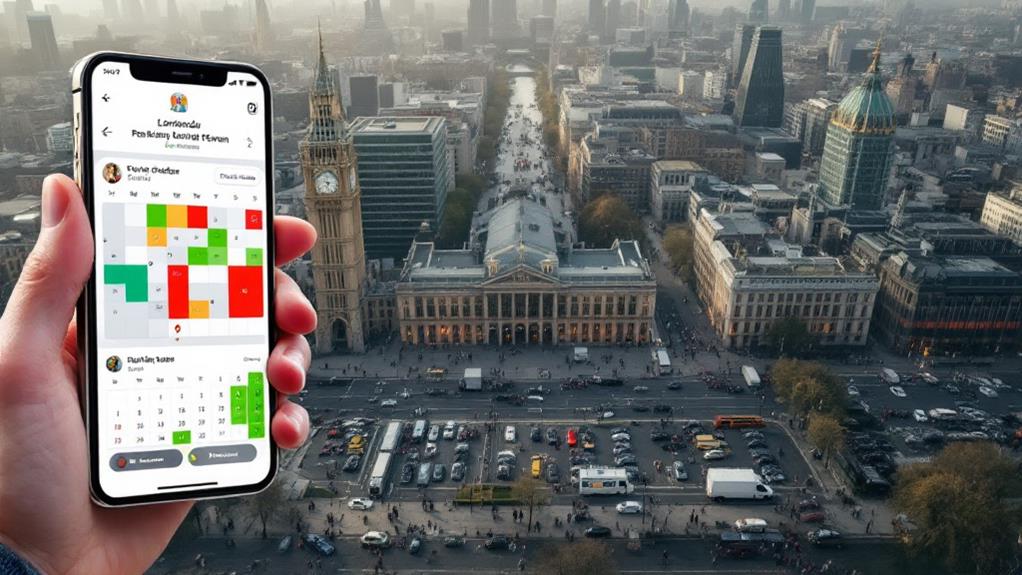
To make your event planning even smoother, you'll want to tap into online resources for the most up-to-date information. Start by visiting the official websites of London events and festivals you're interested in attending. These sites often provide essential details about parking arrangements, public transportation options, and any road closures that might affect your journey.
Many event organizers now use social media platforms to communicate real-time updates. Follow their official accounts on Twitter, Facebook, or Instagram to stay informed about last-minute changes or parking advisories. You can also sign up for email newsletters to receive direct updates from the organizers.
Consider using online parking reservation services to secure a spot in advance. These platforms often offer:
- Discounted rates for pre-booking
- Guaranteed spaces near popular venues
- Detailed maps and directions to parking facilities
- Options for different vehicle sizes and accessibility needs
Don't forget to check local council websites and Transport for London's official site for broader information on parking restrictions, congestion charges, and alternative transportation options during major events. By leveraging these online resources, you'll be better prepared to navigate London's lively event scene and find suitable parking solutions.
Balancing Community and Visitor Needs
London's lively events scene presents a unique challenge: balancing the needs of excited visitors with those of local residents. When you're planning to attend an event, it's important to ponder how your presence impacts the community. Local authorities endeavor to implement effective traffic congestion management strategies to minimize disruption for residents while accommodating visitors.
You'll often find that event organizers work closely with city planners to create temporary parking solutions and improve public transport options. This collaboration aims to reduce the strain on existing infrastructure and maintain a positive experience for both visitors and locals. Infrastructure investment deliberations play a pivotal role in these decisions, as city officials must weigh the benefits of long-term improvements against short-term event needs.
As an attendee, you can contribute to this balance by using public transportation when possible, carpooling, or choosing park-and-ride options. By doing so, you'll help reduce traffic and parking pressure in residential areas. Additionally, respecting local parking regulations and being mindful of noise levels when leaving events will help maintain good relationships between visitors and the community.
